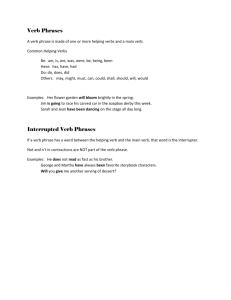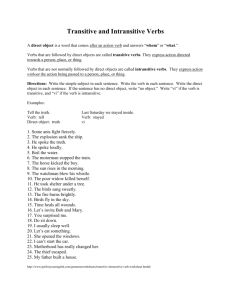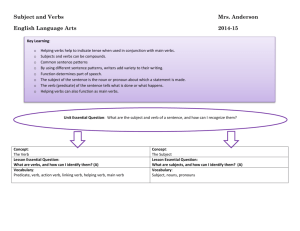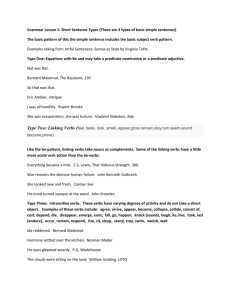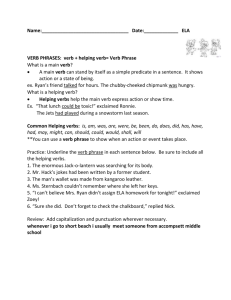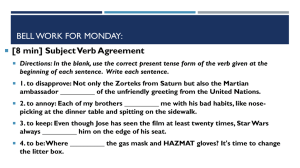Parts of Speech – Verbs - English With Mrs Laufs
advertisement
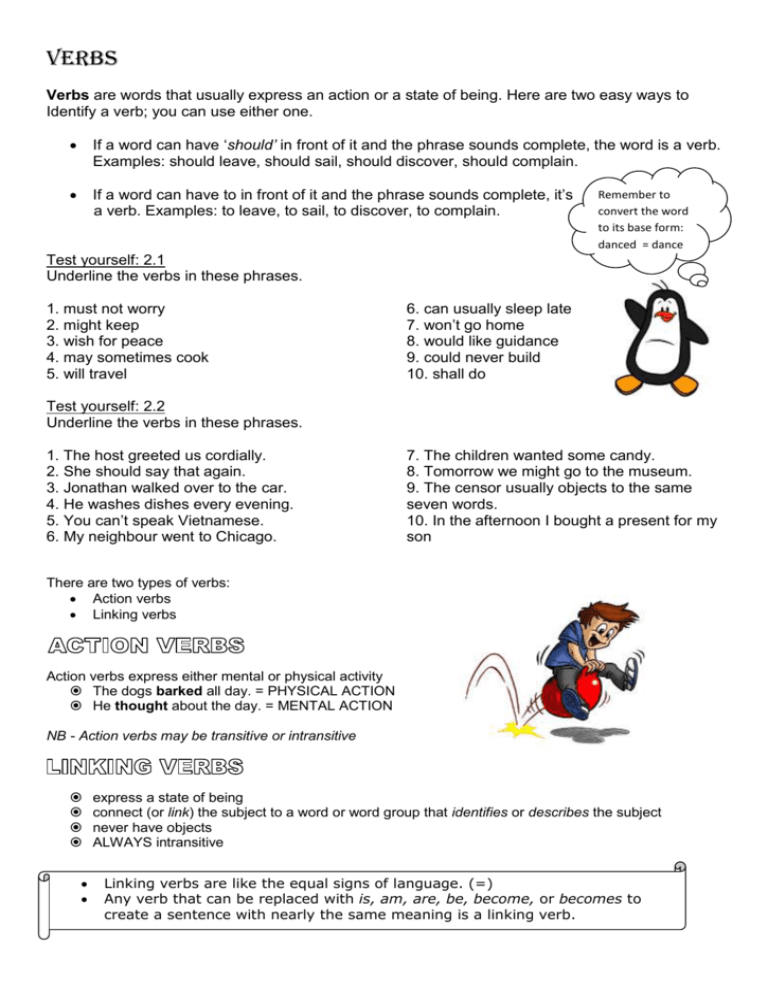
VERBS Verbs are words that usually express an action or a state of being. Here are two easy ways to Identify a verb; you can use either one. If a word can have ‘should’ in front of it and the phrase sounds complete, the word is a verb. Examples: should leave, should sail, should discover, should complain. If a word can have to in front of it and the phrase sounds complete, it’s a verb. Examples: to leave, to sail, to discover, to complain. Remember to convert the word to its base form: danced = dance Test yourself: 2.1 Underline the verbs in these phrases. 1. must not worry 2. might keep 3. wish for peace 4. may sometimes cook 5. will travel 6. can usually sleep late 7. won’t go home 8. would like guidance 9. could never build 10. shall do Test yourself: 2.2 Underline the verbs in these phrases. 1. The host greeted us cordially. 2. She should say that again. 3. Jonathan walked over to the car. 4. He washes dishes every evening. 5. You can’t speak Vietnamese. 6. My neighbour went to Chicago. 7. The children wanted some candy. 8. Tomorrow we might go to the museum. 9. The censor usually objects to the same seven words. 10. In the afternoon I bought a present for my son There are two types of verbs: Action verbs Linking verbs Action verbs express either mental or physical activity The dogs barked all day. = PHYSICAL ACTION He thought about the day. = MENTAL ACTION NB - Action verbs may be transitive or intransitive express a state of being connect (or link) the subject to a word or word group that identifies or describes the subject never have objects ALWAYS intransitive Linking verbs are like the equal signs of language. (=) Any verb that can be replaced with is, am, are, be, become, or becomes to create a sentence with nearly the same meaning is a linking verb. Identifying Action and Linking Verbs Questions to ask yourself. 1) Identify the verb 2) Action or state of being 3) Action = action verb & state of being = linking verb EXAMPLES: We celebrated the Chinese New Year yesterday. Action verb The holiday is usually in February. Linking verb Remain in your seats until the end of class. Action verb Remain calm. Linking verb Exercise 1 1. The ghost appeared in the doorway. 2. The child appeared tired. 3. Bill became the president of the student council. 4. The cloth on the table felt soft and fuzzy. 5. Jeannie grows taller every day. 6. The tree grows every day. 7. John felt sick after lunch food from the picnic smelled rotten. 9. Steve smelled the flowers. 10. Please stay in the house. 11. Mom tasted the soup. 12. The soup tasted salty. 13. Jenny looks at the pictures in the book. 14. Jenny looks beautiful in that dress. 15. The radio sounded the emergency alarm. Auxiliary verbs help the main verb express action or a state of being Examples: can speak may be has been named should have been caught Auxiliary Verb Math auxiliary verb(s) + main verb = verb phrase There may be more than one auxiliary verb in a verb phrase. There is only one main verb in a verb phrase. It is always the LAST WORD in the verb phrase. The main verb is either action (speak, named, caught) or linking (be). NOTE Sometimes a verb phrase is interrupted by another part of speech, like an adverb. In a question, the subject often interrupts the verb phrase. Our school has always held a victory celebration when our team wins. Did you hear Malema’s speech? Auxiliary Verb or Main Verb? The highlighted words can function as main verbs or auxiliary verbs. Can you tell which job each is doing? I am a teacher. I am writing a letter. We are hungry. The girls are playing ball. Exercise 2 Make your own examples using each of these words in two ways: 1) as a main verb and 2) as an auxiliary verb in a verb phrase. a) was b) does c) have Exercise 3 Underline the auxiliary verb in each sentence. 1. Tom was swimming blissfully. 2. I have been looking for you everywhere. 3. The boys were subdued by the day’s events. 4. What will you do when I’m gone? 5. He’s fixed my car. 6. They’re coming right toward the door. 7. The family were still at table, but they had finished breakfast. Test yourself 2.3 If you can do this exercise, you’ve achieved a basic understanding of nouns and verbs. In each sentence below, underline the nouns and put a squiggly line under each verb. Each sentence has only one verb but may have more than one noun. 1. Their daughter announced her engagement later. 2. The surgeon washed his hands. 3. The pianist was diligent. 4. The young boy gritted his teeth. 5. Her assistant is always late. 6. The mayor explained his position. 7. The train came early. 8. Three other customers placed orders that day. 9. Her friend was helpful. 10. That hot meal tastes great.




